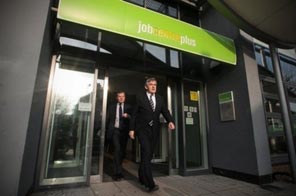Bank of England to keep interest rate low
LONDON: The Bank of England is expected to hold its key interest rate at a record-low 0.50 percent at a meeting on Thursday, analysts said, amid hopes that Britain will soon exit a deep and long-lasting recession.
The BoE is also forecast to announce that it will continue to pump out new money totalling up to 200 billion pounds (222 billion euros, 320 billion dollars) as it seeks to boost lending by commercial banks.
Britain is the last major economy officially in recession but data due later this month is expected to show that the nation returned to growth in the fourth quarter of 2009.
In a bid to lift Britain out of recession, the BoE's monetary policy committee (MPC) decided in March 2009 to slash borrowing costs to their current record low level.
At the same time, the central bank launched a programme of quantitative easing (QE), whereby it creates money by purchasing bonds from commercial institutions. The programme is due to finish at the end of January.
"This week's MPC announcement is unlikely to be the source of much controversy," said Investec Securities economist Philip Shaw.
"The committee will almost certainly keep the (interest) rate at 0.5 percent and the QE target at 200 billion pounds.
"February's meeting becomes the next flashpoint, given that it will coincide with the BoE's next Quarterly Inflation Report."
The BoE's main task is to use monetary policy to keep annual inflation close to a government-set target of 2.0 percent.
Twelve-month inflation jumped to 1.9 percent in November owing to rising fuel prices, recent official data showed. It is expected to rise further in the coming months, before falling back to about 1.0 percent in late 2010, according to the latest BoE estimates.
British gross domestic product (GDP) contracted 0.2 percent during July-September compared with the previous three-month period, recent official data showed.
Britain begins 2010 as the only top economy in recession after the eurozone, France, Germany, Japan and the United States last year all emerged from the deep downturn that was sparked by the global financial crisis.
"Although the (British) economy is showing some sign of revival, we would still like to know what the MPC's Plan B is in case its expected strong recovery does not materialise," said economist Colin Ellis at Daiwa Capital Markets Europe ahead of the BoE's two-day meeting that begins on Wednesday.
Analysts have said the BoE may decide to continue pumping out new money beyond February, when the QE programme is due to have been completed.
The economy, which is struggling with high unemployment and massive public debt caused by the financial crisis, has contracted for six quarters in a row -- its longest recession since official records began in 1955.
Finance minister Alistair Darling recently admitted that Britain's recession would be deeper than thought -- with the economy predicted to have shrunk by 4.75 percent in 2009 compared to a previous estimate of 3.5 percent.
The economy is expected to grow 1.0-1.5 percent in 2010, according to Darling.
Management of the economy is the key issue in a general election due no later that June, with the opposition Conservatives widely expected to oust the incumbent Labour government.






